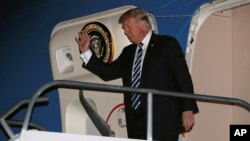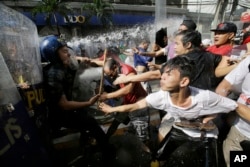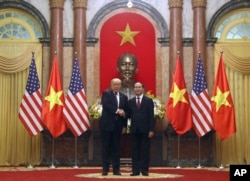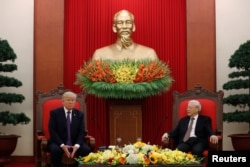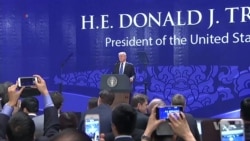U.S. President Donald Trump landed in Manila Sunday for summits with eager but suspicious Southeast Asian leaders.
Trump’s Air Force One reached Manila shortly before 6 p.m. local time after about 3,500 Filipino protesters tried to march on the U.S. Embassy. The protesters shouted for Trump to leave and accused the U.S. government, a former Philippine colonizer of about 50 years, of looking for overseas wars.
“We know America has been launching war all over the world, in all the third-world countries they are trying to get into,” said protester Kristine Cabardo, 23. “U.S. imperialism in the first place brings only war and destruction.
One protest banner read “Dump Trump — #1 Terrorist!”
Thousands of riot police blocked protesters, who were organized in part by a minor left-leaning political party, from reaching the embassy or any venues where Trump is scheduled to attend summits organized by the Association of Southeast Asian Nations through Tuesday.
“Literally the government of the Philippines does not serve its Filipino people,” Cabardo said. “Even the soldiers and the Philippine National Police are not there to protect and serve. They serve and protect the status quo, the U.S.-Duterte regime, the puppet regime of this government.”
Momentum in Vietnam
Before arriving in Manila Trump met in Hanoi with Vietnamese President Tran Dai Quang, and afterwards Trump told a joint press conference, “For trade to work, all countries must play by the rules. I am encouraged that Vietnam has recently become the fastest growing export market to the United States. Mr. President, I applaud your efforts to implement economic reforms and increase Vietnam’s trade and investment in all directions. The United States is enthusiastic about reforms that promote economic prosperity for all Vietnamese citizens.”
He added “We just had a great discussion about American goods and services coming into Vietnam. Two-way street. I am confident that American energy, agriculture, financial services, aviation, digital commerce, and defense products are able to meet all of your many commercial needs. And, in fact, not only meet them but what we do is better than anybody else.”
“We are opening up and you are opening up and it’s going to even out,” Trump told Communist Party General-Secretary Nguyen Phu Trong in Hanoi. “And to think where we are and where we have come, it’s a tribute to both countries. Trade has become a very important element of our relationship.”
Speaking through a translator, Quang described his meeting with Trump as fruitful, saying, “The president’s state visit to Vietnam marks a milestone in Vietnam-U.S. relations, creating strong momentum for the substantive, effective, and stable development of the bilateral, comprehensive partnership.”
North Korea
Trump and Quang also discussed North Korea and the South China Sea.
Trump repeated his warning that North Korea represents a major threat to peace and stability in the region.
"As I said in my speech to the Republic of Korea’s national assembly, all responsible nations must act now to ensure that North Korea’s rogue regime stops threatening the world with unthinkable loss of life. Safety and security are goals that we can progress, not provocation. I mean, we have been provoked, the world has been provoked. We don’t want that. We want stability not chaos and we want peace, not war.”
In a Tweet earlier Sunday, Trump hit back at North Korean leader Kim Jong Un, who had again called him a dotard, a term that describes an elderly person who is losing his mental abilities.
On Twitter, Trump, who has frequently called Kim “Little Rocket Man,”, said, “Why would Kim Jong-un insult me by calling me "old," when I would NEVER call him "short and fat?" Oh well, I try so hard to be his friend - and maybe someday that will happen!”
During his bilateral meeting with Quang, Trump also offered his services as a mediator for the South China Sea dispute. When asked about the offer at the press conference, Quang would only say Vietnam seeks a peaceful resolution to the issue through negotiations and in line with international law.
APEC
Prior to his arrival in Hanoi, Trump was in the central Vietnamese city of Danang, where he attended the annual Asia-Pacific Economic Cooperation summit.
En route to Hanoi aboard Air Force One, Trump reiterated to reporters traveling with him that he discussed with APEC leaders bilateral agreements that have resulted in trade imbalances he says are disadvantageous to the U.S.
"It’s disgraceful. And I don’t blame any of those countries. I blame the people we had representing us who didn’t know what they were doing because they should have never let that happen."
At the close of the APEC meeting, the 21 member nations issued a statement expressing support for free trade and closer regional ties, without any mention of Trump's "America First" doctrine.
WATCH: Leaders of US and China Offer Asia Business Leaders Divergent Paths
Trump joins 17 other heads of state in Manila for discussions likely to cover North Korea, the South China Sea and terrorism from a Southeast Asian angle. Many hope Trump will offer stronger trade and security ties to Southeast Asia but doubt he will announce deliverables this week.
China
On Friday, Trump and his Chinese counterpart, President Xi Jinping, offered starkly contrasting views of the direction for trade in Asia in separate speeches to regional business leaders
Trump told the APEC CEO Summit that he is willing to make bilateral trade agreements with any country in the Indo-Pacific region, but he firmly rejected multi-national deals such as the 12-nation Trans-Pacific Partnership, which was quickly abandoned in the first days of his administration.
"I will make bilateral trade agreements with any Indo-Pacific nation that wants to be our partner and that will abide by the principles of fair and reciprocal trade," Trump said. "What we will no longer do is enter into large agreements that tie our hands, surrender our sovereignty, and make meaningful enforcement practically impossible."
The U.S. president said that in the past when his country "lowered market barriers, other countries didn't open their markets to us."
From now on, however, Trump warned the United States will, "expect that our partners will faithfully follow the rules. We expect that markets will be open to an equal degree on both sides and that private investment, not government planners, will direct investment."
President Xi, whose country's rise has been driven by large-scale government-planning, immediately followed Trump on the stage in Danang.
Xi embraced the multilateral concept, in particular calling for support for a Free Trade Area of the Asia-Pacific (FTAAP), which would harmonize regional and bilateral economic pacts.
China was left out of the TPP, which had been led by the United States and Japan, and was meant in great part as a bulwark against China's strategic ambitions.
The speeches came just hours after Trump left China where he and Xi met several times on Wednesday and Thursday.




